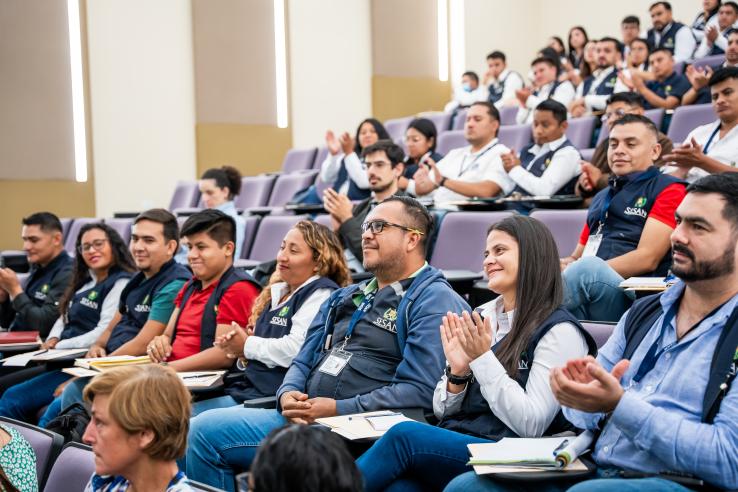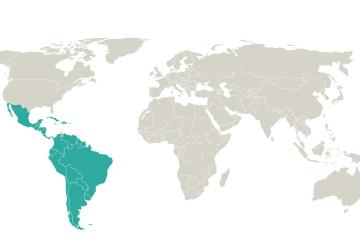
J-PAL LAC government partnerships: Supporting government decision-making in Guatemala

Our work at J-PAL Latin America and the Caribbean (LAC) is made possible by close collaboration with and the dedication of many regional governments who recognize the importance of using data and evidence to improve social programs and public policy. Over the past fifteen years, we have worked with more than twenty government agencies across the region. This is the second blog post in a blog series titled "J-PAL LAC Government Partnerships," in which we are sharing key insights from this invaluable work. Our first post spotlighted lessons on reducing gender-based violence, and the third one highlighted lessons on building a culture of evidence-informed decision-making.
Collaborating with government partners has always been essential to J-PAL LAC’s mission. Governments play a pivotal role in delivering social services to those experiencing poverty, making their engagement imperative for the successful implementation and scaling of evidence-based interventions. J-PAL LAC has ample experience working closely with approximately twenty national and sub-national governments across the region to co-create and utilize evidence, train policymakers in evidence-based decision-making, and strengthen institutional processes that promote the use of data and innovative research in policy making.
By addressing challenges that may hinder the integration of evidence into policy, J-PAL LAC has supported governments in adopting a culture of evidence use, leading to more effective and efficient social programs. This collaborative approach enhances the government's capacity to design and implement impactful policies, ensuring successful interventions can be scaled to benefit larger populations and reduce poverty. Every program, especially a government program, should be guided by a theory of change, or a route that delineates where a program is going (results) and how it plans to get there (activities and outcomes). Usually, it’s easy to identify a problem and the results we want to obtain, however, there is rarely clarity on how to achieve said results. The theory of change, or causal chain of production and results, allows us to:
- Co-create and use evidence
- Help train practitioners and policymakers in evidence use
- Strengthen systems to enable and encourage meaningful engagement with evidence and data
Since establishing a strategic alliance with the Universidad del Valle de Guatemala in 2023, J-PAL LAC has opened collaborations with key government actors responsible for implementing research, data collection, and programs to improve early childhood development (ECD). The alliance has established partnerships with the Ministry of Education (MINEDUC), the Ministry of Social Development (MIDES), and the Secretariat for Food and Nutritional Security (SESAN). These partnerships have focused on the pillars of training, creation and use of evidence, as well as the strengthening of systems.
Throughout 2024 we have trained 349 monitors from SESAN in charge of collecting data on programs that impact the nutritional status of infants; thirty public officials from the Vice Ministry of Policy, Planning, and Evaluation from MIDES who implement and monitor social programs, and have incubated six social development programs targeting the most vulnerable Guatemalans. Through the incubation of programs such as Bolsa Social, Bono Nutricional, and Comedores Sociales, among others, we are working to improve programs that are impacting over 50,000 Guatemalan families. We have also had evidence sharing sessions with key government officials on conditional cash transfers, nutrition, and early childhood development.
In 2025, we look to continue strengthening our relationship with MIDES through a second incubator course aimed at the Office of Planning and Design, looking to instill in the Vice Ministry the tools and mechanisms to design new social programs. We will also continue collaborating with SESAN and MIDES through the Mano a Mano initiative, an inter-institutional approach toward creating healthy households that promote the development of their members and their communities, prioritizing the health of mothers and children, supporting their access to healthy housing and basic services such as education, water, sanitation, food, and employment opportunities. We are strengthening our relationship with the MINEDUC to structure technical assistance that strengthens Early Childhood Stimulation (ECS) programs by providing evidence on effective curricula, optimizing cost-effective approaches to the delivery of services, and identifying new research questions for Guatemala that can be answered through pilots and randomized evaluations. Additionally, we look forward to also providing technical assistance on Early Childhood Education (ECE) programs, identifying challenges in early education program implementation, and exploring evidence-based innovations that can be piloted and tested.
Our close collaborations with our NGO partners have proven instrumental in shaping our research agenda and guiding our strategic engagement with the government, ensuring alignment with national policy priorities. These partnerships have also helped us build trust and credibility with government stakeholders, laying the groundwork for deeper involvement in meaningful policy dialogue. In particular, participating in the Alliance for Early Childhood, as academic leaders, has allowed us to work closely and strengthen our collaboration with our implementing partners, allowing us to continuously inform our research and policy work in ways that directly support our work with government partners.


